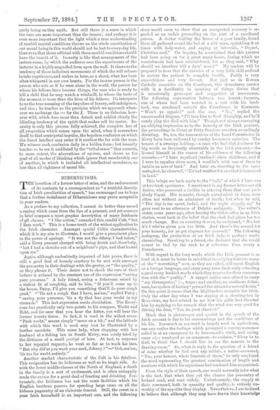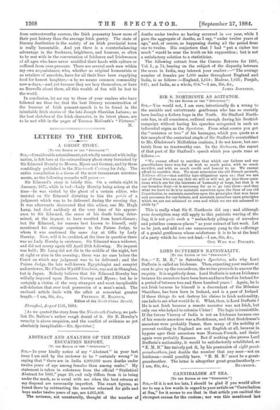HIBERNICISMS.
THE insertion of a former letter of mine, and the endorsement of its contents by a correspondent as "a truthful descrip- tion of Irish peculiarities of speech," has encouraged me to hope that a further instalment of Hibernicisms may prove acceptable to your readers.
As a preface to my collection, I cannot do better than record a saying which came from the lips of a peasant, and yet conveys in brief compass a most graphic description of many Irishmen of all classes. "I like action,". remarked this candid Celt, "but I hate work." This is a home-truth of the widest application to the Irish character. Amongst special Celtic characteristics, which it is my aim to illustrate, I would give a prominent place to the power of apology. "It was not the dthrop I had taken," said a Kerry peasant charged with being drunk and disorderly, "but I had a shmoke out of a neighbour's pipe, and that leaned upon me."
Again, although undoubtedly impaired of late years, there is still a good deal of homely courtesy to be met with amongst the peasantry in their dealings with the gentry, or " the quality," as they phrase it. Their desire not to shock the ears of their betters is evinced by the constant use of the expression "saving your presence." A lady friend, seeing a fisherman seized by a violent fit of coughing, said to him, "If you'll come up to the house, Patsy, I'll give you something that'll do your cough good." " 'Tis not a cough that I have, ma'am," replied Patsy ; "saving your presence, 'tis a fly that has gone wesht in my stomach." This last expression needs elucidation. The KerrSr- man has practically only two points to his compass, Wesht and Esht, and for once that you hear the latter, you will hear the former twenty times. In fact, it is used in the widest sense. "Push wesht," means simply "move on a bit ;" and the latitude with which this word is used may best be illustrated by a further anecdote. This same lady, when stopping with her husband at a fishing inn in South Kerry, was sorely tried by the dirtiness of a small protgge of hers. At last, in response to her repeated requests, he went so far as to wash his face. "But why did'nt you wash your neck, Johnny ?"—" Och,ma'am, 'tis too far wesht entirely."
Another marked characteristic of the Celt is his fatalism. This resignation has its ludicrous as well as its tragic side. As with the lower middle-classes of the North of England, a death in the family is a sort of excitement, and is often unhappily made the excuse for a great deal of feasting and drinking. For- tunately, the Irishman has not the same facilities which his English brethren possess for spending large snms on all the hideous pageantry of an elaborate funeral. Still, the event in a poor Irish household is an important one, and the following
story would seem to show that an unexpected recovery is re- garded as an unfair proceeding on the part of a moribund person. A doctor visiting the house of a poor family, found them all gathered round the bed of a sick man, sprinkling it at times with holy-water, and saying at intervals, "Depart, Christian soul." On inquiry, he ascertained that this process
had been going on for a great many hours, during which no nourishment had been administered, for as they said, " Why
should we interfare wid a dyin' man?" My readers will be prepared to hear that the exercise of a very little skill sufficed to restore the 'patient to complete health. Paddy is very superstitious and very devout. But just as in Roman Catholic countries on the Continent, this devoutness carries with it a familiarity in speaking of things divine that is occasionally grotesque and suggestive of irreverence.
The following conversation between two tenant - farmers, one of whom had been worsted in a suit with his land- lord, was overheard outside the Courthouse in Kenmare.
"Won't ye appale ?" said the one. "No," replied the unsuccessful litigant, "I'll lave him to God Almighty, and he'll surely play the divil with him." Though not always conveying an edifying impression as to the honesty of the Irish peasant, the proceedings in Court at Petty Sessions are often exceedingly diverting. So, too, the transactions of the Land Commission in Kerry have been enlivened by sundry humorous episodes. The tenant of a swampy holding,—a man who had that fondness for big words so frequently observable in the Irish peasant,—de- livered himself in the course of his evidence of the following remarks :—" I have rayalized [realised] siren childhreu, and if I were to rayalize siren more, I wouldn't wish one of them to imbibe an acre of land." And later on, reverting to the same metaphor, he observed, " 'Tis bad weather for one that is immersed. in land."
This brings me back again to the "bull," of which I have one or two fresh specimens. I mentioned in my former letter our old doctor, who possessed a facility in uttering them that was posi- tively Papal. His remarks, though paradoxical in form, were often not without an admixture of truth ; but when lie said, "The day is far spent, bedad, and the night aiqually so," he gave vent to an utterance of Delphic ambiguity. The writer's
sister, some years ago, after leaving the ticket-office in an Irish
station, went back in the belief that the clerk had given her too much change. But on counting it over, he exclaimed, "No, but it's I who've given you too little. And there's the reward for your honesty, for ye get sixpence for yourself." The following malaprop, the production of an Irish lady; is perhaps worth
chronicling. Speaking to a friend, she declared that she would sooner be tied by the neck to a' milestone than marry a Frenchman.
With regard to the long words which the Irish peasant is so fond of, it must be borne in mind that in outlying districts many
of the " mountaing " men, as they are called, still speak English as a foreign language, and carry away from their early schooling a good many bookish words which they reserve for their conversa- tion with the "quality." A ragged native once offered to carry "my thrumperies," i.e., traps ; and another, an assiduous fisher- man, has spoken of having" perused the stream for several hours." . On this point it seems that the Highlanders resemble the Irish. Only the other day when I was staying at a shooting-box in Ross-shire, my host related to me how his gillie had diverted him by replying to his remark that the wiud was very good for driving the deer, "Yes, its jeest classical."
Much that is picturesque and quaint in the speech of the Irish peasant is due to his surroundings and the conditions of his life. Inasmuch as sea-weed is largely used in agriculture, one can realise the feelings which prompted a countrywoman— called in at an emergency to do housemaid's work, and seeing some alga employed as an ornament—to exclaim, "Glory be to God, to think that I should live to see the manure in the drawing-room." So, when in reply to the question of a, friend of mine whether lie had seen any rabbits, a native answered, "Yes, your honour, whole funerals of them," he only employed the word representing the greatest combination of length and numbers with which his experience had rendered him acquainted.
From the style of their speech, one would naturally infer what is the fact, that when they get the chance the peasantry of Ireland read, and read widely. Unfortunately, the supply at their command, both. in quantity and quality, is entirely un- worthy of the appetite they display. Nevertheless, I am inclined. to believe that although they may have drawn their knowledge from untrustworthy sources, the Irish peasantry know more of their past history than the average Irish gentry. The state of literary destitution in the society of an Irish provincial town is really lamentable. And yet there is a counterbalancing advantage in the freshness, brightness, and humour, so often to be met with in the conversation of Irishmen and Irishwomen of all ages who have never muddled their heads with culture or suffered from over-pressure. There are several such men within my own acquaintance, who, whether as original humourists or as retailers of anecdote, have for all their lives been supplying food for honest laughter,—a by no means common commodity now-a-days,—and yet because they are lazy themselves, or have no Boswells about them, all this wealth of fun will be lost to the world.
In conclusion, let me say to those of your readers who have followed me thus far, that the best liteinry reconstruction of the humour of Irish peasant-speech is to be found in the inimitable Irish stories of the late Joseph Sheridan Lefanu; as the best sketches of the Irish character, in its latest phase, are to be met with in the pages of Terence McGrath's "Pictures."
M.

































 Previous page
Previous page